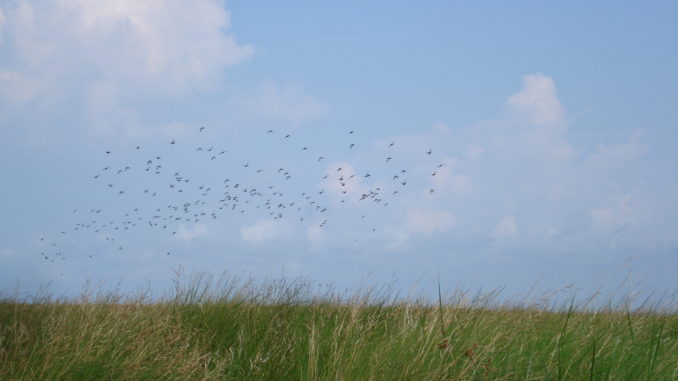
It seems like here in south Louisiana we get things in extremes. It’s either hot or cold, with rarely an in-between. Sometimes we pray for rain to alleviate drought, and other times we get floods. As it relates to the waterfowl hunting conditions here in Louisiana, it seems like more often than not we’re praying for rain to flood our fields and backwaters – but this year it looks like Mother Nature has outdone herself.
November 2009 Pre-Duck Season Migration Update
The word from around the state is “too much rain.” From the Arkansas line to the coastal parishes, the excess rain in recent weeks has excessively flooded agricultural fields, delaying some field-preparation efforts and also created backwaters in places that haven’t seen a flood in years. With southerly winds prevailing in recent weeks, coastal marshes also have been much higher than usual, scattering what birds have arrived so far. A survey of guides around the state echoes a lot of the same sentiment as we hit the home stretch in the countdown to opening day.
Up in Mer Rouge, the word out of Colby Daniels with Top Gun Guide Service (318-647-5807) is “way too much water.” Daniels reports decent numbers of birds showing up, but he’s finding them to be scattered with the overabundance of flooded terrain.
“We’re seeing big numbers of specks, with a good many snows and blues, though we’re not yet seeing too many ducks,” Daniels said. “As far as timing, it seems to be about normal, and for specks maybe even a bit above normal for this early in November.”
As an upside to the flooded conditions, Daniels feels that it may help preserve some of the feed a bit longer than usual as the birds are prevented from feeding on it too heavily this early.
Heading down to the southwest corner of the state, Erik Rue of Calcasieu Charter Service (337-598-4700) also reports strong showings of geese with the last few fronts in the ag fields between Hayes and Lake Charles.
“Specks are showing up in force, along with some white geese,” Rue said. “In the last week, I’ve seen a big increase in ducks, mainly grays, showing up in the marshes surrounding Big Lake during our fishing trips.”
As far as timing, Rue also felt that what he’s seeing thus far seems to be relatively on schedule with observations of recent years.
Heading a bit east from there, the report from Rick Hall of Doug’s Hunting Lodge (800-888-0960) over in the Klondike area was promising.
“We were all pretty grim for a while, but it’s changing as we speak,” Hall said. “I wouldn’t quite call it ‘wonderful’ but a lot better than just yesterday, and especially better than what was seen over the weekend. Our marsh above the Intracoastal Waterway is now full of big ducks, and the fallow fields are holding good numbers of ducks and geese.”
Hall also mentioned a strong report he received out of the Thornwell area of specks showing up in impressive numbers.
In response to all the excess water, Hall also felt more farmers would be forced to buffalo fields in preparation for the season instead of the more typical plowing via disc.
However, moving over to the southeast corner of the state, some aren’t exactly impressed with the showings so far.
Mike Smith of Louisiana Marsh Guide Service (504-682-1966) reports rather weak numbers of big ducks in the Reggio area.
“We’re loaded with bluewing teal right now like we should have been during the teal season, but I’m only seeing a handful of grays,” Smith said.
However, the veteran guide was optimistic.
“Our marsh is in the best shape I’ve seen in years, and I’m expecting more big ducks any day now,” Smith said.
Like many coastal hunters, Smith is hoping for another good front to deliver better numbers of grays and wigeon, and to help alleviate some of the high water that’s been lingering in the marsh the last few weeks.
Clearly there’s some promise so far in the upcoming season, but time will tell if the weather cooperates between now and the two openers. Hopefully Old Man Winter has a bout of impatience this year and helps drive the migration to the great wintering conditions awaiting the birds here in south Louisiana.


